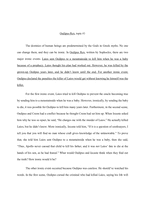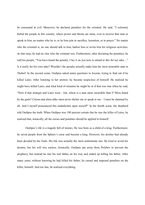미국대학 영문학 에세이_오에디우스_ENG_Oedipus
The destinies of human beings are predetermined by the Gods in Greek myths. No one can change them, and they can be ironic. In Oedipus Rex, written by Sophocles, there are two major ironic events. Laios sent Oedipus to a mountainside to kill him when he was a baby because of a prophecy. Laios thought his plan had worked out. However, he was killed by the grown-up Oedipus years later, and he didn’t know until the end. For another ironic event, Oedipus declared the penalties the killer of Laios would get without knowing he himself was the killer.
For the first ironic event, Laios tried to kill Oedipus to prevent the oracle becoming true by sending him to a mountainside when he was a baby. However, ironically, by sending the baby to die, it was possible for Oedipus to kill him many years later. Furthermore, in the second scene, Oedipus and Creon had a conflict because he thought Creon had set him up. When Iocaste asked him why he was so upset, he said, “He charges me with the murder of Laios.” He actually killed Laios, but he didn’t know. More ironically, Iocaste told him, “If it is a question of soothsayers, I tell you that you will find no man whose craft gives knowledge of the unknowable.” To prove that, she told him Laios sent Oedipus to a mountainside when he was a baby, then she said, “Thus, Apollo never caused that child to kill his father, and it was not Laios’ fate to die at the hands of his son, as he had feared.” What would Oedipus and Iocaste think when they find out the truth? How ironic would it be?





 분야
분야


